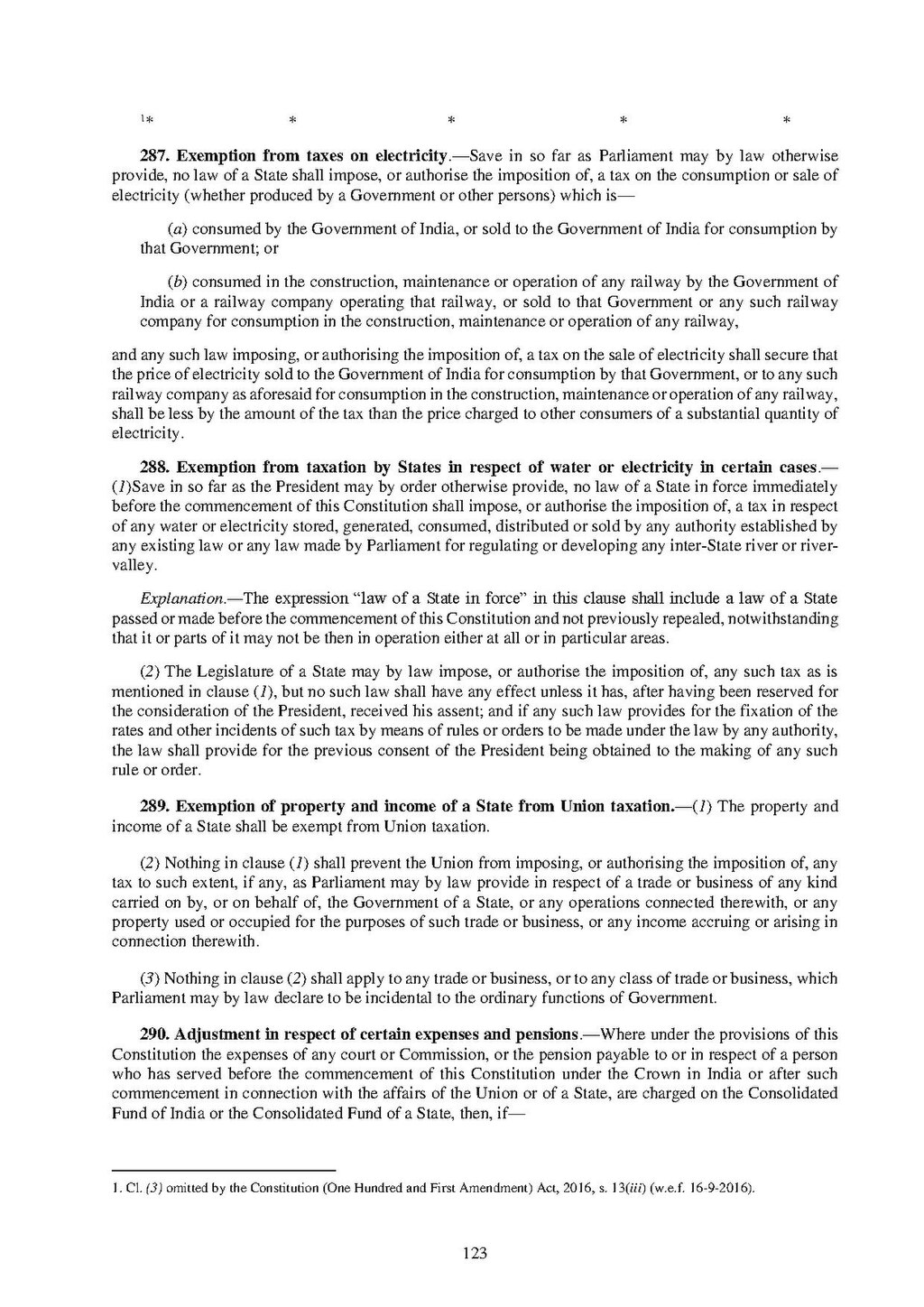[1]*****
287. Exemption from taxes on electricity.—Save in so far as Parliament may by law otherwise provide, no law of a State shall impose, or authorise the imposition of, a tax on the consumption or sale of electricity (whether produced by a Government or other persons) which is—
- (a) consumed by the Government of India, or sold to the Government of India for consumption by that Government; or
- (b) consumed in the construction, maintenance or operation of any railway by the Government of India or a railway company operating that railway, or sold to that Government or any such railway company for consumption in the construction, maintenance or operation of any railway,
and any such law imposing, or authorising the imposition of, a tax on the sale of electricity shall secure that the price of electricity sold to the Government of India for consumption by that Government, or to any such railway company as aforesaid for consumption in the construction, maintenance or operation of any railway, shall be less by the amount of the tax than the price charged to other consumers of a substantial quantity of electricity.
288. Exemption from taxation by States in respect of water or electricity in certain cases.—(1) Save in so far as the President may by order otherwise provide, no law of a State in force immediately before the commencement of this Constitution shall impose, or authorise the imposition of, a tax in respect of any water or electricity stored, generated, consumed, distributed or sold by any authority established by any existing law or any law made by Parliament for regulating or developing any inter-State river or rivervalley.
Explanation.—The expression “law of a State in force” in this clause shall include a law of a State passed or made before the commencement of this Constitution and not previously repealed, notwithstanding that it or parts of it may not be then in operation either at all or in particular areas.
(2) The Legislature of a State may by law impose, or authorise the imposition of, any such tax as is mentioned in clause (1), but no such law shall have any effect unless it has, after having been reserved for the consideration of the President, received his assent; and if any such law provides for the fixation of the rates and other incidents of such tax by means of rules or orders to be made under the law by any authority, the law shall provide for the previous consent of the President being obtained to the making of any such rule or order.
289. Exemption of property and income of a State from Union taxation.—(1) The property and income of a State shall be exempt from Union taxation.
(2) Nothing in clause (1) shall prevent the Union from imposing, or authorising the imposition of, any tax to such extent, if any, as Parliament may by law provide in respect of a trade or business of any kind carried on by, or on behalf of, the Government of a State, or any operations connected therewith, or any property used or occupied for the purposes of such trade or business, or any income accruing or arising in connection therewith.
(3) Nothing in clause (2) shall apply to any trade or business, or to any class of trade or business, which Parliament may by law declare to be incidental to the ordinary functions of Government.
290. Adjustment in respect of certain expenses and pensions.—Where under the provisions of this Constitution the expenses of any court or Commission, or the pension payable to or in respect of a person who has served before the commencement of this Constitution under the Crown in India or after such commencement in connection with the affairs of the Union or of a State, are charged on the Consolidated Fund of India or the Consolidated Fund of a State, then, if—
- ↑ Cl. (3) omitted by the Constitution (One Hundred and First Amendment) Act, 2016, s. 13(iii) (w.e.f. 16-9-2016).
123
